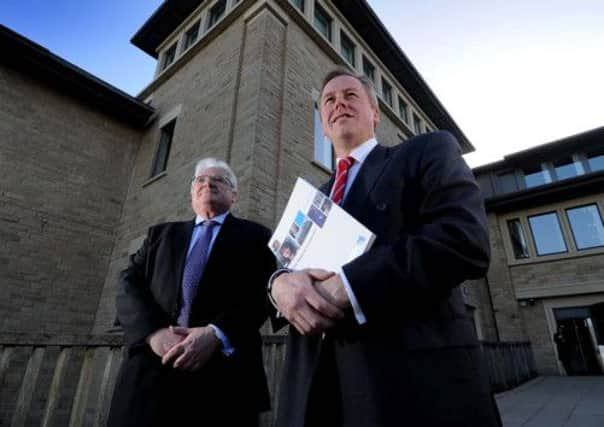Funding for Lending scheme is harming savers, warns Skipton


Chief executive David Cutter said that demand for deposits has been “considerably reduced” as a consequence of state-backed efforts to increase lending to borrowers. But he added that the scheme, which is due to be extended for another year to 2015, is helping to “breathe some life” into the housing market.
The UK’s fourth largest building society faced questions from members over the pay and perks of its top executives, but chairman Mike Ellis said that remuneration has to be market competitive to “attract and retain talent”.
Advertisement
Hide AdAdvertisement
Hide AdHe said that the main reason for the increase in the remuneration of the executive directors was due to the performance of the society in 2012.
Skipton’s pre-tax profits rose 64 per cent to £36.4m from £22.2m in 2011 and its mortgage book increased by 3.5 per cent to £10.5bn as it grew its market share. Mr Ellis said: “Your society made good progress in 2012, increasing its profitability and strengthening its balance sheet.”
Mr Cutter’s total pay and benefits surged 29 per cent to £623,000 last year. His basic pay edged up about two per cent to £352,000, while his bonus more than trebled to £181,000 following a turnaround in the group’s loans and savings business.
Finance director Richard Twigg’s total remuneration package was £472,000 in 2012, up from £364,000 the year previously. Mr Ellis’ total fees climbed to £155,000 in 2012 from £94,000 in 2011.
Advertisement
Hide AdAdvertisement
Hide AdOne member, Brian Wall, who described himself as “a miserable saver”, was among those who questioned the level of remuneration paid to directors.
He said: “Frankly, it makes me sick. It’s a building society not a bank plc, it’s here for the benefit of the savers and people who have mortgages. I think you are going a bit too far at the moment and you’re not going to be very popular at all.”
Another member, Peter Cussons, said: “The board has come under a lot of criticism which I feel is completely unjustified. I’ve been a member for a very long time, I’ve been highly satisfied, they have had a very successful year and I think they are to be congratulated.”
The report on directors’ remuneration was approved with 87.44 per cent voting for the resolution. All other resolutions were passed.
Advertisement
Hide AdAdvertisement
Hide AdMr Ellis said: “Looking after the savings of people and enabling home ownership is at the very heart of the building society. As a mutual it is retained earnings that generate the capital we require to sustain the business.
“The interest margin between what we pay savers and charge borrowers is one of the key drivers of retained earnings. At Skipton we have one of the lower interest margins among building societies, which has been of considerable benefit to members during the recent difficult economic climate.”
But he said that the mutual “is not oblivious to the plight of savers in a low interest rate environment and in a savings market that has recently seen further reductions in interest rates”. “We operate in the same competitive market as all other financial institutions, and we have remained and will remain competitive in the savings market whilst cognisant of the rates of interest we can earn in the mortgage market.”
Mr Ellis said that the situation is “likely to persist for some time” until the economy improves and official interest rates start rising. Mr Cutter said that the average savings rate paid across all Skipton’s accounts as of December 31, 2012, was 2.56 per cent, the same figure as a year previously.
Advertisement
Hide AdAdvertisement
Hide Ad“By historical standards you will no doubt think this is a small amount but it is considerably more than the half a per cent that the society earns on the liquidity it places overnight with the Bank of England.”
Skipton’s mortgages and savings division reversed a pre-tax loss of around £13m in 2011 to record pre-tax profits of £4.9m in 2012. Net lending for the group amounted to £356m, compared to £412m in 2011, of which £304m was in the UK, representing 4.1 per cent of the growth in the UK residential mortgage market compared to a natural market share of 0.8 per cent.
Skipton saw a £0.2bn rise in savings balances to £9,462.4m in 2012, while its gross mortgage lending was £1.5bn for the year, following a three-fold uplift to £1.7bn in 2011. Skipton said its membership dropped to 744,000 from 760,000 in 2011, “as a result of a strategy of prudent growth in response to current market conditions”.
It said its core tier one capital ratio – a measure of strength – was up from 10.5 per cent to 11.1 per cent at the end of 2012 compared to a year previously.